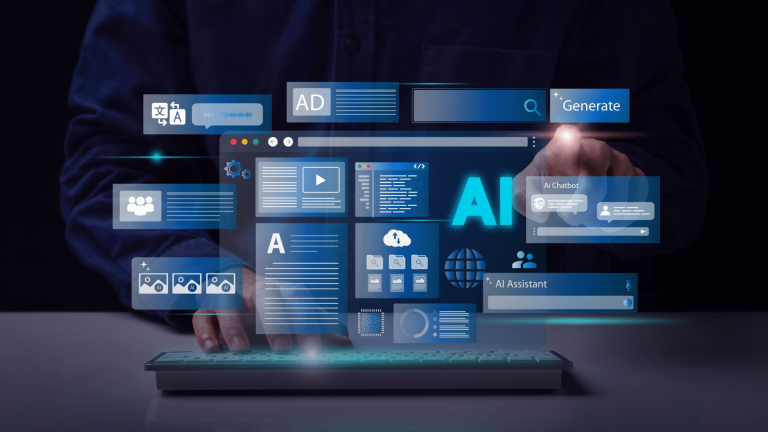Generative AI refers to a powerful branch of artificial intelligence that can create new and original content — including text, images, videos, and even music — by learning patterns from existing data. Unlike traditional AI, which mainly analyzes or classifies information, generative AI models like ChatGPT, Jasper AI, and Copy.ai can produce creative and human-like content in seconds. This groundbreaking technology has quickly become a game-changer in the content marketing industry, reshaping how businesses communicate, engage, and promote their brands.
Marketers can now generate blog posts, ad copies, social media updates, and personalized emails at scale — without compromising quality or tone. It enables teams to save time, improve creativity, and tailor content to audience preferences with precision. From small startups to global corporations, companies are leveraging generative AI to streamline content workflows and enhance campaign performance.
In this article, we’ll explore the impact of generative AI on content marketing, discussing its major benefits, the challenges it presents, and the future trends that will continue to redefine how content is created and consumed in the digital age.
What Is Generative AI?
Generative AI is a type of artificial intelligence designed to create new and original content rather than simply analyzing or processing existing data. It uses advanced machine learning models to generate text, images, videos, music, and even code — all based on the patterns it learns from massive datasets. Unlike traditional AI, which focuses on recognition, prediction, or classification (such as identifying spam emails or recommending products), generative AI goes a step further by producing entirely new outputs that resemble human creativity.
At the core of generative AI are powerful technologies like Generative Pre-trained Transformers (GPT) and diffusion models. GPT models, such as ChatGPT, use natural language processing to understand context and generate coherent, human-like text. Diffusion models, on the other hand, power tools like DALL·E and Midjourney, which create highly realistic images from simple text prompts by progressively refining visual noise into clear pictures.
This technology’s versatility makes it invaluable across industries. In content marketing, it can draft blog posts, design visuals, and even produce video scripts. In entertainment, it composes music or generates storylines. Overall, generative AI blurs the line between human and machine creativity, unlocking endless possibilities for innovation and automation.
How Generative AI Is Revolutionizing Content Creation
Generative AI is transforming the way marketers create, distribute, and optimize content by automating many of the time-consuming tasks once handled manually. AI-driven writing tools such as ChatGPT, Jasper AI, and Copy.ai can now generate engaging blog posts, catchy ad copies, product descriptions, and even social media captions in minutes. These platforms use natural language processing (NLP) and machine learning to understand brand tone, target audience preferences, and content goals — producing text that feels authentic and human-like.
For marketers, this means a significant reduction in production time and an increase in content output. Instead of spending hours brainstorming and drafting, they can generate multiple variations of an ad or post instantly, allowing teams to test and refine ideas faster. This scalability enables brands to maintain a consistent online presence while focusing more on strategy and creativity rather than repetitive writing tasks.
Many leading companies are already leveraging generative AI for personalized marketing campaigns. For instance, Coca-Cola has used AI tools to create customized ad visuals and copy, while HubSpot integrates AI-driven content assistants into its platform to help marketers craft optimized blog posts. Similarly, Netflix and Amazon employ AI to personalize recommendations and promotional messages. As generative AI continues to evolve, it’s not just speeding up content creation — it’s redefining how brands communicate with their audiences on a deeper, data-driven level.
Key Benefits of Generative AI in Content Marketing
Generative AI brings a wide range of advantages that are revolutionizing the way businesses plan and execute their content marketing strategies. One of the biggest benefits is improved content personalization and targeting. AI tools can analyze large amounts of user data — such as demographics, behavior, and preferences — to generate content that speaks directly to specific audience segments. This allows marketers to deliver personalized messages, improving engagement and conversion rates while strengthening customer relationships.
Another major advantage is enhanced creativity and brainstorming support. Generative AI assists marketers in generating fresh ideas for blog topics, headlines, or ad campaigns. By analyzing existing market trends and successful content, AI can suggest creative directions that inspire human marketers to think outside the box. It acts as a digital brainstorming partner, helping overcome writer’s block and sparking new perspectives.
AI also delivers cost efficiency and faster turnaround times. What used to take a team days or weeks can now be done within hours. This automation reduces the need for extensive manpower while maintaining high-quality standards, allowing businesses to focus on strategy and storytelling.
Finally, generative AI supports data-driven decision-making by evaluating performance metrics and audience interactions. It helps marketers identify what type of content works best, which platforms drive the most engagement, and how future campaigns can be optimized. Together, these benefits make generative AI an indispensable tool for modern content marketers aiming for both efficiency and innovation.
Challenges and Ethical Concerns
While generative AI offers remarkable advantages, it also brings several challenges and ethical concerns that marketers must address responsibly. One major issue is the risk of low-quality or plagiarized AI-generated content. Since AI tools rely on existing data to produce new material, there’s always a possibility of repetitive phrasing or unintentional copying. This can harm a brand’s reputation and negatively impact SEO if not properly reviewed and edited by humans.
Another concern is transparency and authenticity. Audiences value genuine communication, and when content is AI-generated without disclosure, it can lead to trust issues. Readers may feel misled if they discover that a supposedly human-written article or ad was created by an algorithm, diminishing brand credibility.
The threat to creative jobs and originality also raises debate. As AI becomes more capable of writing and designing, there’s fear that it might replace human creators. However, while AI can replicate style and tone, it lacks true emotion, cultural understanding, and empathy — elements that make human creativity unique.
To navigate these issues, marketers must ensure human oversight in all AI-generated content and follow ethical AI guidelines. Transparency, quality control, and responsible use are essential to maintaining authenticity and building long-term trust with audiences.
The Role of Human Creativity Alongside AI
Generative AI is a powerful tool, but it’s not a replacement for human creativity — it’s an enhancer. While AI can produce content quickly and efficiently, it lacks the emotional depth, cultural understanding, and intuition that humans bring to storytelling. True creativity comes from human experience — the ability to connect with audiences on a personal level, evoke emotions, and reflect values. AI can assist in generating ideas, refining drafts, and providing data-driven insights, but humans give content its soul and authenticity.
For marketers, the most effective approach is collaboration between AI and human creativity. Marketers can use AI tools like ChatGPT or Jasper AI to brainstorm headlines, analyze audience behavior, or outline campaigns, while still infusing their unique voice and brand personality into the final content. This partnership allows for faster production without sacrificing originality or emotional appeal.
By blending the analytical power of AI with human imagination, marketers can craft messages that resonate deeply with audiences while staying authentic to their brand identity. In essence, AI provides the structure and scale, while human creativity provides meaning — together, they form the perfect balance for modern content marketing success.
Future of Content Marketing with Generative AI
The future of content marketing will be deeply intertwined with generative AI, as new technologies continue to reshape how content is created, optimized, and delivered. One of the most exciting trends is AI content optimization, where advanced algorithms will not only generate text but also refine it in real time for tone, engagement, and SEO performance. Future AI tools will automatically adjust keywords, sentence structures, and readability based on audience feedback and analytics data.
Another emerging area is AI-powered video generation. Platforms are already experimenting with tools that can create realistic video content from simple text prompts, complete with virtual actors, voiceovers, and visuals. This will make video marketing more accessible to small businesses that previously lacked the resources for professional production. Similarly, voice-based content will gain traction as AI voice generators produce podcasts, ads, and interactive brand experiences that sound naturally human.
In addition, future generative AI systems will integrate more deeply with SEO and analytics platforms, enabling marketers to track performance, predict trends, and adjust strategies automatically. This seamless integration will make campaigns more efficient, data-driven, and personalized. Ultimately, generative AI will empower marketers to focus less on repetitive creation and more on storytelling, strategy, and innovation.
Conclusion
Generative AI is undeniably transforming the world of content marketing, making it faster, smarter, and more personalized than ever before. From writing blog posts and creating visuals to optimizing campaigns, AI is helping marketers scale creativity and efficiency to new heights. However, as powerful as it is, generative AI should be used responsibly — with human oversight, ethical consideration, and a focus on maintaining authenticity.
The key lies in finding the right balance between automation and human imagination. When used thoughtfully, generative AI doesn’t replace creativity — it amplifies it. As technology and human ingenuity continue to evolve together, the future of marketing will be defined by this powerful fusion of data-driven intelligence and emotional storytelling, shaping a more innovative and connected digital world.


